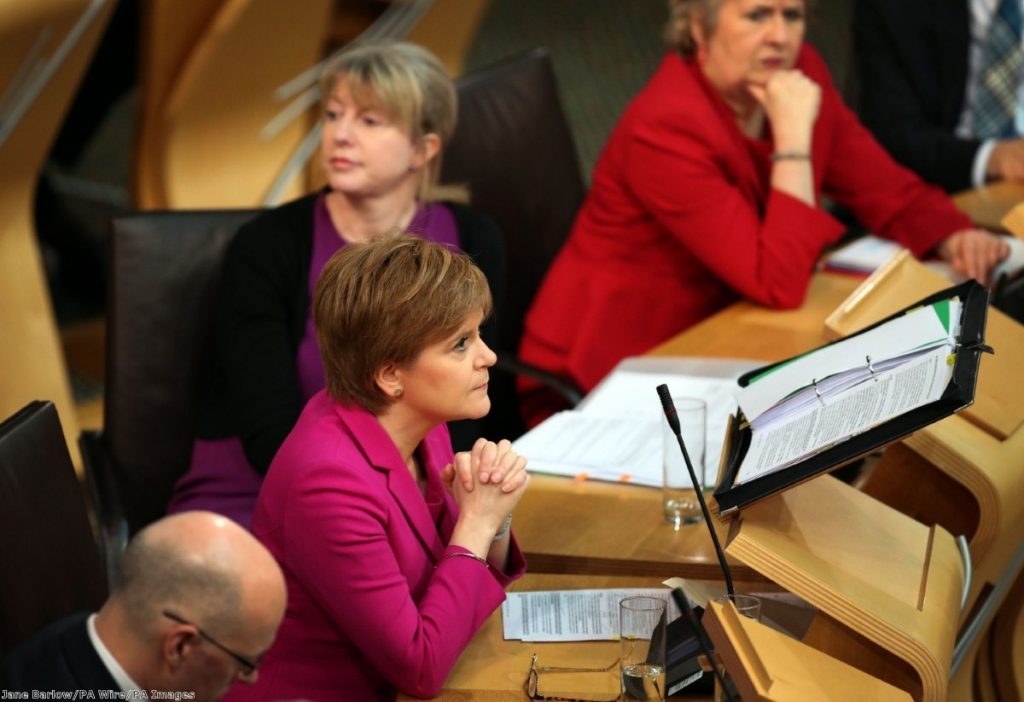By David Torrance
On his appointment as secretary of state for Scotland in July 1995, the Thatcherite Michael Forsyth signalled his intention to hammer Labour over its plans to give its promised Scottish parliament the ability to vary the basic rate of income tax by 3p.
He dubbed this the "Tartan Tax", and indeed Forsyth's campaign was so successful that Labour felt compelled to ask Scots two questions in the 1997 devolution referendum: one on the creation of a devolved legislature, the other on tax-varying powers (both were endorsed by a majority of voters).
It proved, however, academic. Although the SNP fought the first Scottish election campaign in 1999 on the basis of activating the Tartan Tax (increasing the basic rate by a penny), no Scottish political party had any intention of taxing Scots more (or indeed less) than those in other parts of the UK.


Today, however, Michael (now Lord) Forsyth has been proven correct, just 22 years later. In this afternoon's Scottish Budget, finance secretary Derek Mackay increased the higher and additional rates of income tax by a penny (to 41p and 46p respectively), froze the basic rate and announced two new tax bands: a 21p 'intermediate' rate and a 19p 'starter' rate.
The Scottish government says no one earning less than £33,000 a year will pay any more as a result – that's 70% of tax payers – while anyone earning less than £13,000 will pay 'slightly' less. Overall, it'll raise a modest amount, £164m, which the finance secretary says will allow him to 'reverse' real-terms cuts to Scotland's resource budget.
So these income tax changes and the revenue they'll raise are hardly 'radical', but that isn't really the point. For the first time in two decades, the Scottish parliament and its government have delivered a grown-up budget, a significant break with not only devolutionary orthodoxy (that Scotland should not diverge fiscally from the rest of the UK) but also SNP thinking over the past decade.
"I have decided to reform Scotland's income tax system," declared Derek Mackay during his statement, which for any long-standing observer of Scottish politics was quite a moment. I've long criticised the SNP for being cautious to the point of inactivity when it comes to translating their 'progressive' rhetoric into fiscal reality, so the party deserves credit for finally biting the bullet.
The political context, of course, is everything. In March 2016, when first minister Nicola Sturgeon announced that (then) chancellor George Osborne's higher rate threshold increase wouldn't apply in Scotland, the SNP were still riding high with a majority at Holyrood and all but three MPs at Westminster. Since then, of course, they've lost their majority in Edinburgh and 21 of their MPs in London. Furthermore, the Scottish government has increasingly found itself squeezed between a resurgent Scottish Tory Party on the Right and a recovering Scottish Labour Party on the Left.
Thus today's Budget can be seen, as usual, as a clever bit of triangulation (although its delivery by Mackay was woeful), modestly increasing taxes for higher earners but also cutting them for the very lowest. Judging by the muted Tory and Labour responses in the Chamber, it succeeded in taking the wind out of their sails: sure, the Conservatives railed against what they called the 'Nat Tax', saying the SNP had gone too far, while Richard Leonard, the still relatively new Scottish Labour leader, said they hadn't gone far enough.
I suspect the SNP will be quite happy to find themselves in the middle of those two critiques, while they've undeniably taken a further tilt to the Left, useful, they believe, in halting any Labour recovery (they've clearly written off centre-right Scots in electoral terms). Another significant announcement in the Budget, although Derek Mackay wasn't explicit about it, was that Scotland's independent schools will no longer benefit from business rate reductions due to their charitable status – another big shift for a party that's long ducked any overt class war.
The finance secretary was keen to stress that his Budget was delivered in the context of 'the most challenging economic and fiscal environment for any budget in the devolution era'. It is true that the Scottish block grant is being reduced, though not by as much as the Scottish government claims, but it's also constrained by the SNP's own spending decisions: ring-fencing health spending and maintaining 'free' university tuition necessitates cuts elsewhere within a largely fixed budget, and Westminster can hardly be blamed for that.
Away from the headline tax announcements, meanwhile, economic growth forecasts remain dire, and although careful modelling means the Scottish government's planned changes shouldn't damage Scotland's economy, they seem unlikely to improve it either.
Campaigning two decades ago, Michael Forsyth was also of the opinion that supposedly egalitarian Scots weren't necessarily prepared to pay more in tax than their counterparts elsewhere in the UK. With the measures announced in today’s Scottish Budget, the SNP is about to put that to the test.
David Torrance is a freelance commentator and Nicola Sturgeon's biographer. Follow him on Twitter.
The opinions in politics.co.uk's Comment and Analysis section are those of the author and are no reflection of the views of the website or its owners.

